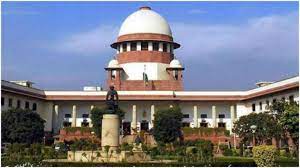Supreme Court strikes down 10.5% reservation for Vanniyars in Tamil Nadu
By Lokmat English Desk | Updated: March 31, 2022 13:15 IST2022-03-31T13:15:00+5:302022-03-31T13:15:00+5:30
The Supreme Court Thursday upheld the Madras High Court judgement striking down the law brought in Tamil Nadu last ...

Supreme Court strikes down 10.5% reservation for Vanniyars in Tamil Nadu
The Supreme Court Thursday upheld the Madras High Court judgement striking down the law brought in Tamil Nadu last year providing 10.5 per cent reservation to Vanniyars, within the Most Backward Classes (MBC) community, in government jobs and admissions to educational institutions. The top court said it was done solely on the basis of numbers without adequate data to show the relative backwardness of the Vanniyar community. Upholding the HC judgement, a bench of Justices L Nageswara Rao and B R Gavai said it is of the opinion that the law did not provide any substantial basis to treat Vanniyar as a separate group compared to others among MBCs. Thus, the 2021 Act is ultra vires the Constitution, it said.
The court also ruled that though there is no fetter placed on the power of the state to legislate, and caste can be the basis of such internal reservation, it cannot be the sole basis. The bench referred to the Supreme Court ruling in the Indra Sawhney case, saying “on the issue of caste based classification”, it had “stated that caste can be the starting point but not sole basis. Similarly, caste can be the starting point for providing internal reservation but it is incumbent on the State Government to justify the reasonableness of the decision and to demonstrate that caste is not the sole basis”. The Madras HC had ruled that the law brought in by the then AIADMK government shortly before the elections was without quantifiable data on the socio-educational status of the Vanniyars. The SC said that the state government had committed an error in accepting the recommendations of the Tamil Nadu Backward Classes Commission chairman on the basis of which it made the law as they were based on the Janarthanam Commission Report that relied on antiquated data.